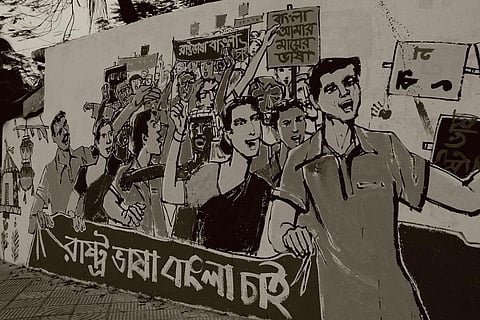মোদের গরব, মোদের আশা, আ মরি বাংলা ভাষা !
মাগো তোমার কোলে, তোমার বোলে, কতই শান্তি ভালবাসা !
মাগো তোমার কোলে, তোমার বোলে, কতই শান্তি ভালবাসা !
আ মরি বাংলা ভাষা !
মোদের গরব, মোদের আশা, আ মরি বাংলা ভাষা !
কি যাদু বাংলা গানে- গান গেয়ে দাঁড় মাঝি টানে,
কি যাদু বাংলা গানে- গান গেয়ে দাঁড় মাঝি টানে,
গেয়ে গান নাচে বাউল-
গেয়ে গান নাচে বাউল- গান গেয়ে ধান কাটে চাষা।
মোদের গরব, মোদের আশা, আ মরি বাংলা ভাষা !
আ মরি বাংলা ভাষা !
মোদের গরব, মোদের আশা, আ মরি বাংলা ভাষা !
বিদ্যাপতি, চণ্ডী, গোবিন, হেম, মধু, বঙ্কিম, নবীন-
বিদ্যাপতি, চণ্ডী, গোবিন, হেম, মধু, বঙ্কিম, নবীন-
ঐ ফুলেরি মধুর রসে,
ঐ ফুলেরি মধুর রসে, বাঁধলো সুখে মধুর বাসা ।
আ মরি বাংলা ভাষা !
মোদের গরব, মোদের আশা, আ মরি বাংলা ভাষা !
বাজিয়ে রবি তোমার বীণে, আনলো মালা জগৎ জিনে-
বাজিয়ে রবি তোমার বীণে, আনলো মালা জগৎ জিনে-
তোমার চরণ-তীর্থে –
মাগো তোমার চরণ-তীর্থে – আজি, জগৎ করে যাওয়া-আসা
আ মরি বাংলা ভাষা !
মোদের গরব, মোদের আশা, আ মরি বাংলা ভাষা !


